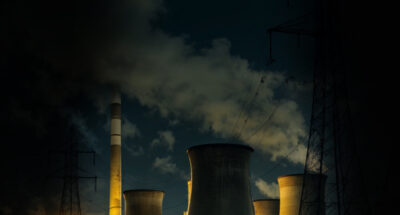
Don’t believe the hype: Making good use of a blackout
The Spanish blackout of April 2025 is an opportunity to strengthen electricity systems that have higher shares of renewables and should not be used as an excuse to slow down the energy...

by Susan Goldsworthy Published September 8, 2022 in Sustainability • 9 min read
Our society is obsessed by growth; it’s how we measure the success of organizations and of countries. And yet, it’s this very obsession that is accelerating our own demise. All around us, as we observe widespread evidence of ecological destruction, it’s easy to slip into a state of despair or denial. Neither of these are helpful.
We live on a planet that has the capacity to provide everything that we humans, and other species, require to live. However, our excessive consumption – not to mention the extraction of resources – has led to a situation where the world’s natural abundance can no longer be taken for granted. International research organization the Global Footprint Network estimates the point each year when these natural resources have been depleted. This year, their so-called Earth Overshoot Day is July 28. This is the day when we have ‘used’ all the resources that Earth regenerates for an entire year.
At the heart of the ecological crisis is the dominant myth of modernity – that endless growth, engineered by humans, is possible on a planet with finite resources. However, this is a short-term approach which looks to immediate benefits over long-term viability, feeding a societal perspective that frowns on decay. It promotes competition over collaboration, profits over people, and material success as the primary route to happiness. Behind the shiny face of consumerism lies a ticking time bomb.
In their book, Active Hope: How to Face the Mess We’re in without Going Crazy, Joanna Macy and Chris Johnstone refer to three defining stories of our time.
The first story, and the one that dominates mainstream society, is that of Business As Usual. In this scenario, economic growth is vital for prosperity and wellbeing, and humans see themselves as above all other living things: these exist primarily as resources. This is a consumerist utopia, where massive inequalities between the haves and have-nots is “unfortunate”, and the main goal of external success measured by wealth is achieved through competitive means. For some to succeed, others must fail.
The second story is The Great Unravelling, characterized by economic decline, a depletion of natural resources, global pandemics, hardships caused by climate change, the mass extinction of species, and an increase in social and political unrest.
The third story is The Great Turning, which involves a transition from an extractive economy to a regenerative one and the emergence of a life-sustaining society. According to the authors, there are three dimensions of The Great Turning that need to occur simultaneously if we want to achieve this: holding actions in defense of life on earth, life sustaining systems and practices through the development of new economic and social structures, and a shift in consciousness whereby we change our perception, thinking and values.
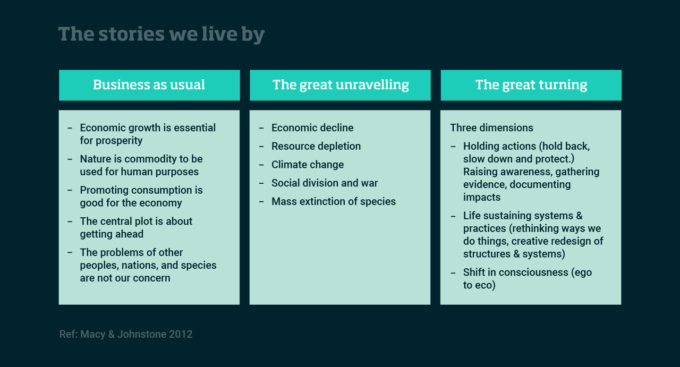
In my work with executives, I ask people to stand by which story they feel they are living in most and then to state where they believe their organizations are primarily operating. The majority of participants put themselves in The Great Unravelling and their organizations in Business As Usual.
This state of mind is echoed in a survey I have been running since 2020 of more than 2,000 executives, which shows an increase in the numbers of people operating from a place of survival and burn-out – between 35% and 75%. Even those who say they are operating in what we call the “performance zone” report that they flip more easily into frustration or anger. There is an unhealthy state of “dis-ease” in our lives as we face up to the increasingly visible impacts of our way of life; from floods, heatwaves, and global pandemics to social division, war, supply chain challenges, and shortages of food and water.

How do we move from Business As Usual to a regenerative future?
We need to be able to look ourselves in the mirror when one day we ask ourselves, “What did we do once we knew?” This is urgent and challenging work; what is at stake is the wellbeing of our children, and our children’s children, as well as the other species with whom we must co-exist.
The growth required is introspective, where we shift our consciousness from an ego perspective to an ecological one. Continuing as we are will only ensure our own and other species’ destruction.
To achieve this inner growth, we need to embrace the word “limits”, understanding that, as living systems, we humans and the planet have constraints. Nature can be a natural balancer or violent corrective force. Take overfishing as an example. Once there would have been an endless supply through reproductive cycles, but now there are massive depletions in stocks because of short-term thinking. All living beings are interconnected, and the actions we take as humans in terms of satisfying our appetites have far-reaching consequences. We can choose whether the actions we take contribute to our long-term wellbeing or our short-term addictions. As such, adopting external limits will help us to thrive.
In 1972, the Club of Rome, a non-profit, informal organization of intellectuals and business leaders whose goal is a critical discussion of pressing global issues, commissioned a study on the effects and limits of continued worldwide growth. The resultant best-selling book, The Limits to Growth, argued that irrespective of the technological advances that might come, the world cannot support the present rates of economic and population growth for more than a few decades without a high risk of creating a collapse of civilization. At the time, the message was not properly understood and there was a strong backlash. As Vice President of The Club of Rome Carlos Álvarez Pereira pointed out, the message of striving towards a future of reconciling human wellbeing with the wellbeing of the planet was ignored, with the book labelled a “doomsday prophecy”. However, the predicted consequences of continuing with the Business As Usual scenario have proven remarkably accurate.

Limits and Beyond, issued on the 50th anniversary of The Limits to Growth, once again takes stock and asks fundamental questions regarding the survival of humanity and a finite planet. In his chapter, Álvarez Pereira emphasizes that we need to learn what we already know.
“No doubt we have now learnt about the impact that human development is having on our planet, but we cannot say we have learnt until we have changed. Learning is not just an exercise in conscious reasoning. It requires a focus on cultural change. What we need is more than policy change, which is catered for in the existing frameworks. We need to change the way we relate to each other and to all life on our planet. We need to shift from a culture of individualism to a culture of reconnecting with our deep humanity and ancient wisdom. This is a task that is available to anyone and one that needs to be taken on by everyone if we are to succeed. The dissonance to the growth story is happening, perhaps below the radar but we see it in emerging trends like the Great Resignation and in the conversations that are happening outside of official discourse.”
Move from an ego-centric use of language
A good place to start in facilitating this mindset shift is our language, which reflects our ego-centric bias and belief that humans are separate from, as opposed to intrinsically linked to, the rest of the natural world.
Instead, for example, of referring to “mankind”, which is a patriarchal and dominant term, or the elitist “humankind”, we can refer to ourselves as an inextricable part of “livingkind”. By doing this, we shift our position, perspective, thoughts, and, in turn, our actions.
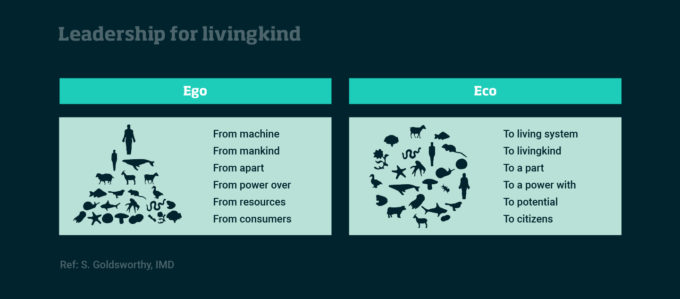
Embrace the language of living systems
Look at the language in your own company and consider how much is based around “machine” metaphors such as “the engine of growth” and “key performance indicators”. Take some time to consider how you can change these words to ones that better reflect living systems. For example, why not use the term “potential” instead of “resources”, or “citizens” not “consumers”.
Encourage openness to inspire hope
Keeping dialogue open as a leader is essential, as this gives rise to hope, which inspires action. It provides the energy for us to continue to act, irrespective of the outcome. Hope is about creating a culture of knowing what I do or say makes sense and is a moral responsibility regardless of the end result.
With hope, we can mobilize and inspire others – hope is contagious, and there are many solutions. For example, we know there’s enough food to feed everyone on the planet – and yet, many starve while others are morbidly obese and throwing away food. But it means changing the way we live, the way we work. This starts with being more local, more community-based, more sustainable. Vertical farming company Infarm provides us with an excellent example of this shift in mindset in action.
Be bold agents for positive change
You can also act from within your organization. Yes, we need radicals, people who push visibly and vocally against the dominate norms. But we also need what Professors Deborah Meyerson and Maureen Scully refer to as tempered radicals – those who decide to stay within the system and push for change from the inside. Tempered radicals want to succeed in their organization, yet they want to live by their values and identity – even if they are somewhat at odds with the dominant culture. These people nudge the company little by little to be more socially responsible. It’s this conscious action by many people every day that will result in incremental but lasting change.
The food industry has a massive impact on our climate – around a third of all greenhouse gas emissions come from this industry. We have a broken food system that needs to be reimagined. Infarm, the world’s fastest-growing vertical farming company, is creating the solutions for tomorrow through technologies that are available for us today.
According to Infarm’s vision paper, humanity must produce more food in the next four decades than we have produced in the last 8,000 years, and we have now crossed several of the Earth’s planetary boundaries which define the safe zone in which humanity can exist. Staying on the current trajectory by sticking to the existing ways in which food is produced, distributed, and consumed would mean a catastrophic future. Only another great agricultural revolution can save us from the path of no return.
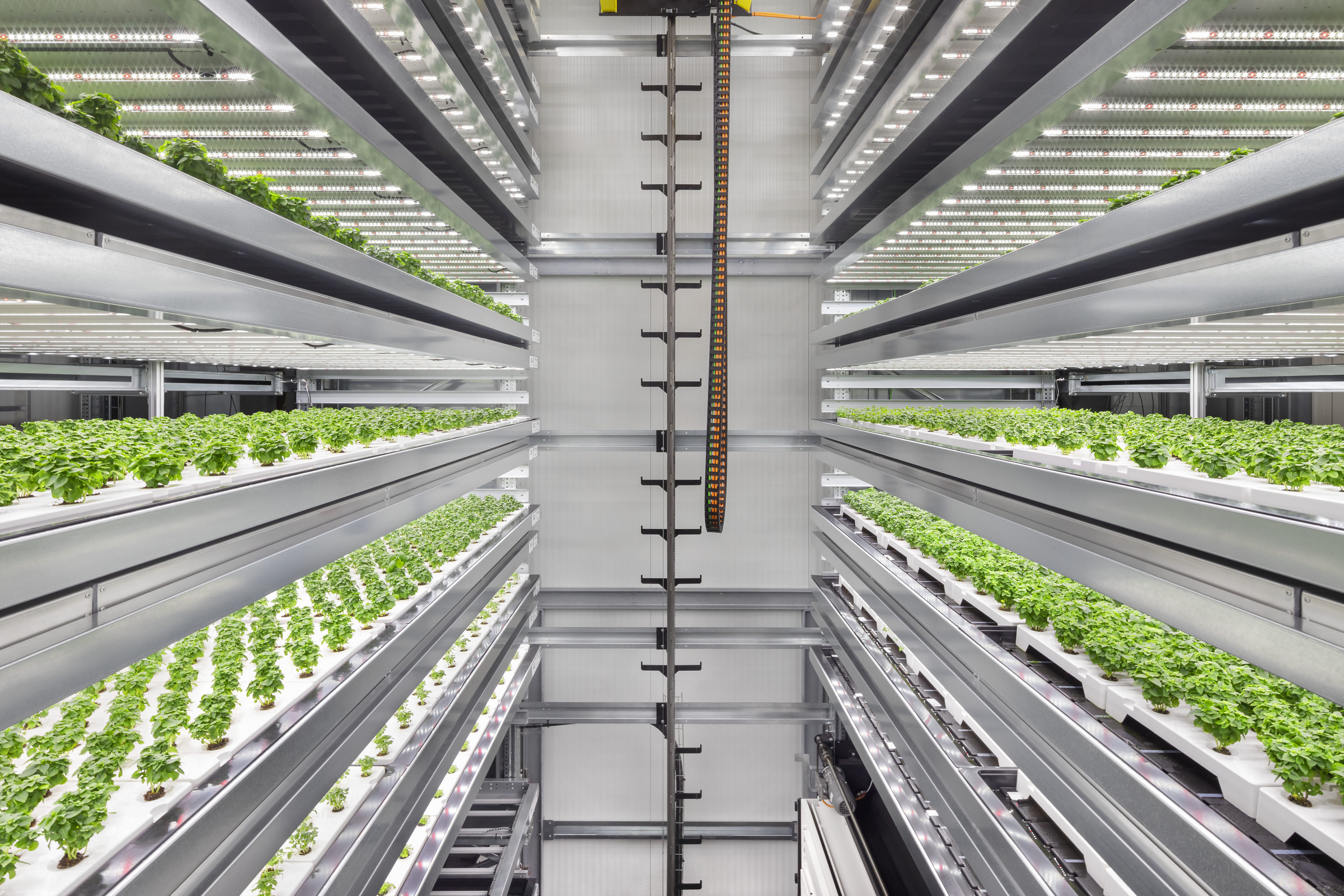
Infarm was founded in Berlin in 2013 with a vision to find another way of efficiently producing food without the heavy social and environmental price tag. The company grows plants vertically, using 95% less land and 95% less water compared with conventional farming. This is done without chemical pesticides, avoiding damaging agricultural runoff. The farms are inside urban centres, as close as possible to the end consumer, and hence their supply chain is significantly shorter.
Through the high-quality data harvested, analysed, and interpreted by the company’s cloud connected farms, Infarm is continuously learning, improving, and optimising its processes. This means better quality, tastier and more resource-efficient plants. The company already has partnerships with more than 30 of the world’s top retail chains in 10 countries and plans to expand to 20 more countries by 2030. The company has also committed to setting a science-based net zero carbon target by the end of 2022 through the Science Based Targets initiative and is actively encouraging other companies in the vertical farming sector to join them on their decarbonization trajectory.
Here are some practical steps anyone can take to enable the mindset shift we need:
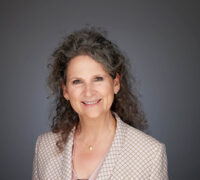
Affiliate Professor of Leadership, Communications and Organizational Change at IMD
Susan Goldsworthy OLY is an Affiliate Professor of Leadership, Communications and Organizational Change at IMD. Co-author of three award-winning books, she is also an Olympic swimmer. She is a highly qualified executive coach and is trained in numerous psychometric assessments. She is Director of the IMD Executive Coaching Certificate and Program Director of the Leading Sustainable Change program.

July 9, 2025 • by Cédric Philibert in Sustainability
The Spanish blackout of April 2025 is an opportunity to strengthen electricity systems that have higher shares of renewables and should not be used as an excuse to slow down the energy...

July 7, 2025 • by Julia Binder, Esther Salvi in Sustainability
Lindström found that expanding its business to Asia required overcoming cultural barriers as much as building new services and infrastructure while adapting itself to local needs. ...

June 16, 2025 • by Núria Ibáñez-García in Sustainability
Driving change in a system where progress can be slow and regulation is tight isn’t easy. But for Núria Ibáñez-García, sustainable transformation starts with steady influence, applied from within. ...

June 9, 2025 • by Julia Binder, Esther Salvi in Sustainability
Dr. Kiri Trier, the beauty giant’s regional sustainability chief, explains her drive to change customer habits and make cutting waste, refilling, and recycling part of their daily bathroom routine....
Explore first person business intelligence from top minds curated for a global executive audience